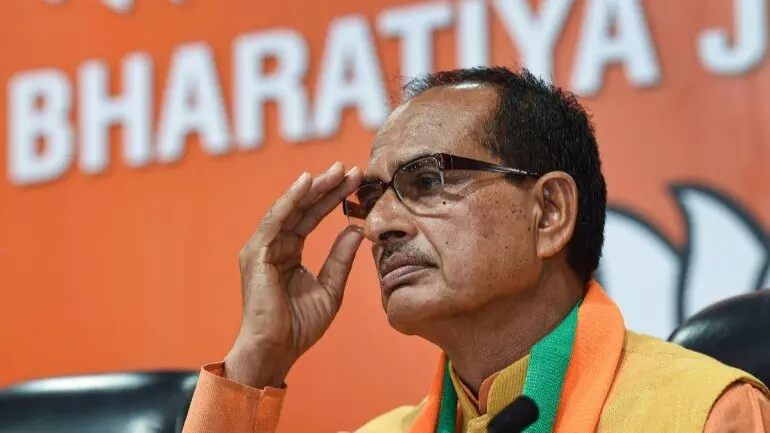
Madhya Pradesh polls: BJP banks on Modi magic for 'Mission 150-plus'
Despite strong anti-incumbency, it will be a close contest between BJP and Congress

With less than four months left for the Assembly elections in Madhya Pradesh, the ruling Bharatiya Janata Party (BJP) is determined to win more than 150 seats to make up for a shock defeat five years ago.
While the BJP realises that it faces an anti-incumbency wave after the three-term rule of Chief Minister Shivraj Singh Chouhan, senior leaders believe the party will focus on the popularity of Prime Minister Narendra Modi, who will be the main face of the campaign in the sprawling state.
“The election will be fought under the leadership of Narendra Modi and the work done by the Union and state governments. The PM is the most popular leader, so he automatically becomes the choice for leading the campaign. Chouhan is the chief minister, so he is also the face of the campaign,” said a senior BJP leader in Bhopal.
Modi to lead from front
BJP members said the decision to campaign and contest under Modi's leadership is because he is able to galvanise the cadre and people to vote for the BJP. Another reason is that the BJP faces a “fatigue factor” in the state.
The BJP won a whopping 28 of the 29 Lok Sabha seats in 2019 and in the process dominated in more than 215 assembly segments. But when assembly elections had taken place, the BJP could manage to win only 109 seats in the 230-member assembly.
“The BJP has been preparing for elections in Madhya Pradesh and Chhattisgarh since the day we lost the elections. The reason we announced the names of 39 candidates in Madhya Pradesh and 20 in Chhattisgarh is that we want to start early,” said Jaiveer Shergil, a national spokesperson for the BJP. “We are confident we will be able to retain power in Madhya Pradesh and repeat our performance in the Lok Sabha elections,” he added.
The 20 of the 39 Madhya Pradesh constituencies where the BJP has named its candidates is where the difference in votes between Congress and BJP was less than 5,000 votes. In 8-9 constituencies, the winning margin was less than 15,000 votes.
Close contests
BJP leaders pointed out that the division of votes occurred due to the three-cornered split in votes involving the Congress, BJP and the Gondwana Ganatantra Party (GGP) – which affected BJP's chances.
BJP leaders confirmed that the party was in talks with the GGP for an alliance in order to increase its chances of winning the Assembly elections.
“There are people who have asked why the candidate list was announced three-four months before the elections. The reason is we are prepared. We are prepared for the elections, we know the importance of these Assembly elections,” said RP Singh, another national spokesperson for the BJP.
BJP leaders also said that while the Congress was the single largest party in the 2018 assembly elections by winning 114 seats with a 40 per cent vote share, the BJP gathered 41 per cent of the votes but got just 109 seats.
According to them, in at least one-third of the Assembly seats in Madhya Pradesh the outcome was decided by less than 7,000 votes and in most cases by less than 5,000 votes.
BJP leaders said that in the 230-member assembly, 76 seats witnessed close contests in 2018. Of these, the BJP was on top in 35 and the Congress in 36. Three 3 seats went to the Bahujan Samaj Party (BSP) and two to independents.
Samajwadi Party, BSP factors
Even as the Opposition is preparing for a pan-India electoral contest against the BJP, the first glimpse of this battle will be visible in Madhya Pradesh.
Though the elections in Madhya Pradesh and Chhattisgarh are essentially a direct contest between the Congress and BJP, the role of smaller parties can be decisive to the overall outcome.
The role of the Samajwadi Party (SP) and BSP would be crucial in Madhya Pradesh. BJP leaders said that while the Congress and SP were likely to reach an understanding in some constituencies, the BJP’s role is crucial as it controls 5-6 percent of the votes in the state and has a presence in 80-90 constituencies.
BSP chief Mayawati, a former chief minister of Uttar Pradesh, has announced that it will not ally with either the Congress or the BJP in the Assembly elections. BJP leaders said that Mayawati has extended support to Congress in Madhya Pradesh in the past with an eye a also to defeat the BJP.
A BSP leader from Uttar Pradesh said the party did not favour an alliance now and it wanted to contest the Madhya Pradesh and Chhattisgarh elections on its own strength.
“But a post poll alliance cannot be ruled out because BSP stands for social justice. If there is a government in Madhya Pradesh that works for the poor and marginalised sections and stands for social justice, then we do not rule out the possibility of an alliance,” the leader said.
BSP factor
Political analysts believe the list of seats announced by the BJP has been done to avoid any infighting in the state unit because these are seats where the winning and losing margin was low.
“All 39 seats announced by the BJP witnessed close contests with the Congress. The tickets have been announced to also give candidates time to prepare for the election without the fear of any internal sabotage,” said Yatindra Singh Sisodia, professor and director at the Madhya Pradesh Institute of Social Science Research, Ujjain.
Sisodia added that parties like the BSP and GGP act as amplifiers of votes for bigger political parties. He said that the BSP enjoys a committed voter base of 5 per cent; that is why political parties want an alliance with smaller parties because it increases the chances of their candidates winning.

